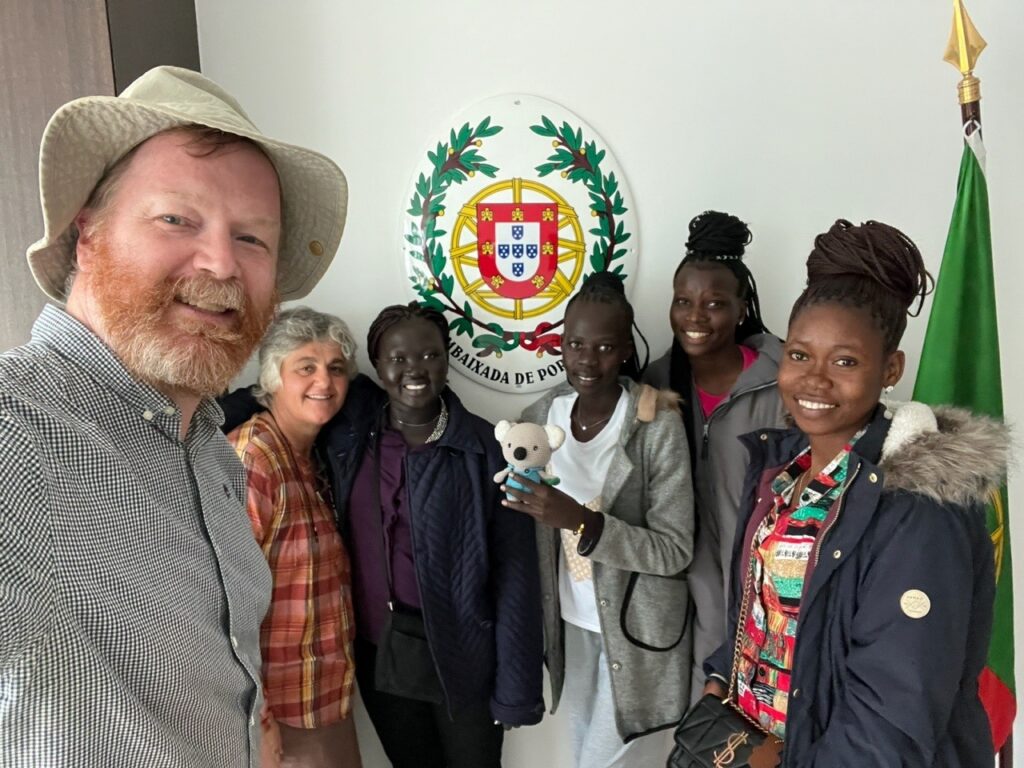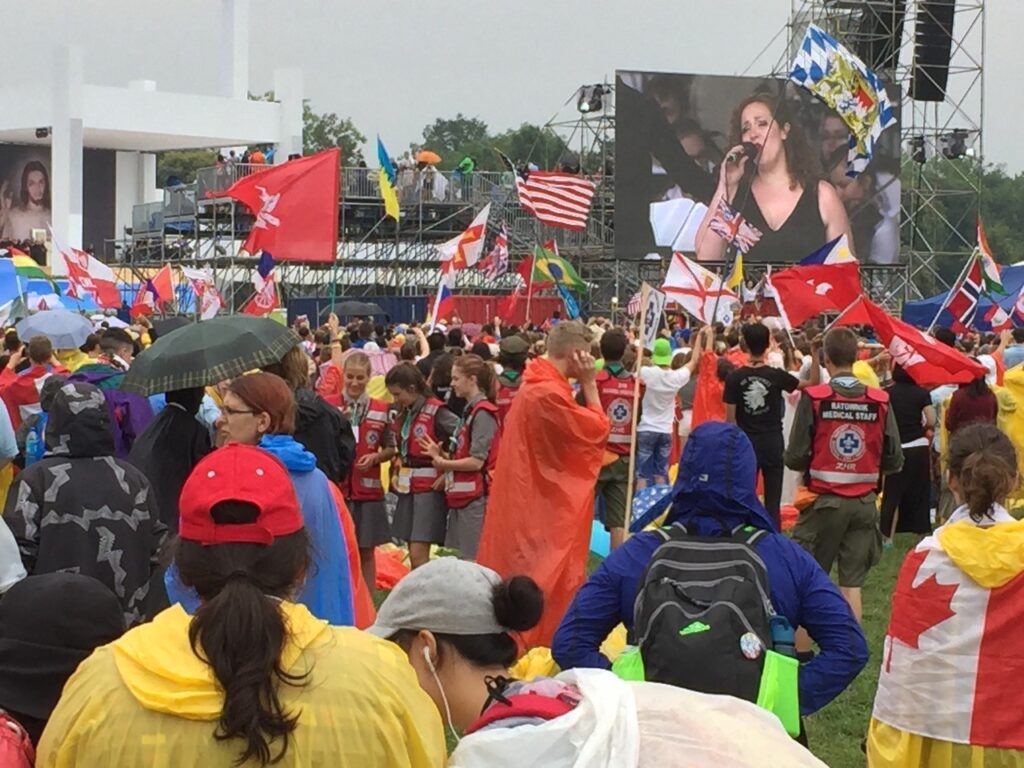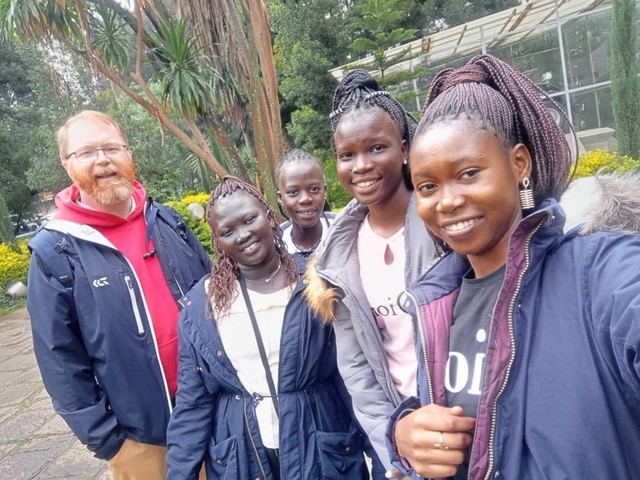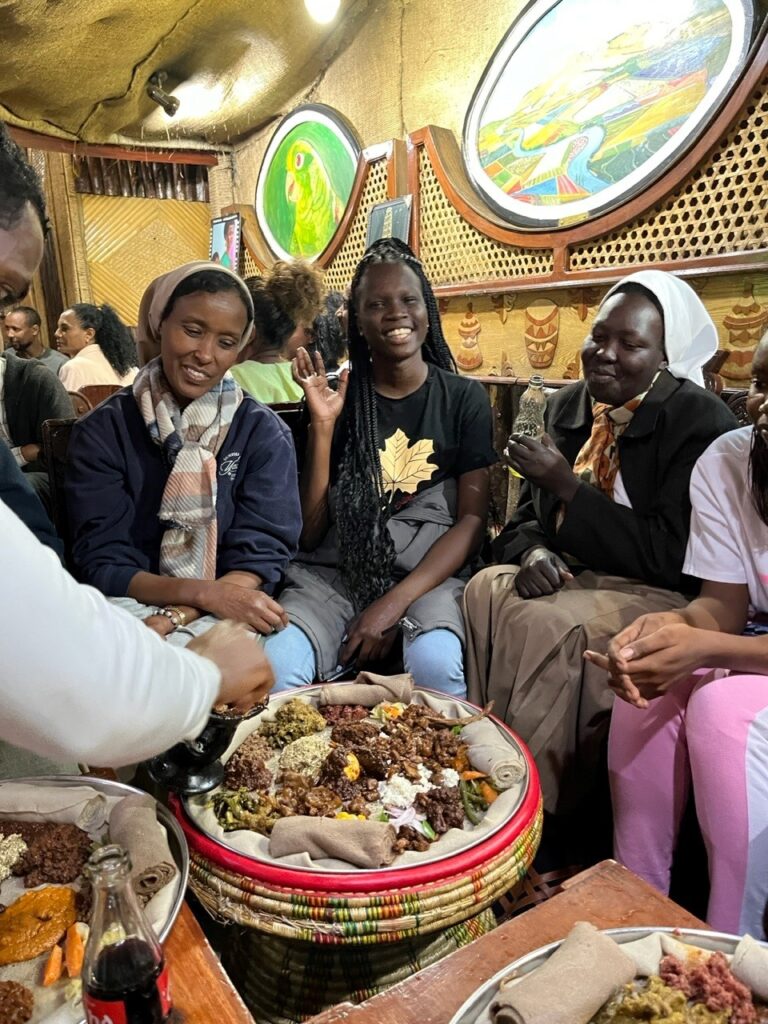
Ten days in Addis Ababa was unavoidable. If you want to get a Schengen Visa for four South Sudanese pilgrims to go to World Youth Day (WYD) in Lisbon there really is no other way other than through Ethiopia. In fact, conventional wisdom among those familiar with the ins and outs of international travel would have said that ten days was being wildly optimistic. Holding on to hope, Sr. Beta, a wonderful Portuguese Comboni Sister, four young South Sudanese women, and myself began the first leg of our pilgrimage into the unknown as we tried to make our way to Lisbon to join 1,500,000 other young Catholics for World Youth Day.
Traditionally every three years the Pope calls young people from around the world to gather, to pray, to serve, and to celebrate their faith. The invitation is always responded to enthusiastically. Beginning with Pope John Paul II in 1985, millions subsequently came to cities like Rome, Sydney, Madrid, and Buenos Aires. Lisbon was my fifth WYD, having previously attended Cologne, Rio, Krakow, and Panama. They are week long events, sleeping on school floors, enduring cold showers, and queueing for two hours to get something to eat at Burger King. If you think it sounds like hell, you couldn’t be more wrong – most of the time. In fact, it is in the chaos, where young Catholics from every corner of the planet come together to remind us as Jesus says in John 17 that we are one. But more on that later.

World Youth Day is a special kind of Spirit filled chaos. Here is one from our time in Krakow in 2016.
To get there though would require a miracle, but miracles are never in short supply if you have eyes to see. On arriving in Addis we were warmly welcomed by Sr. Marisa, the head of the Comboni Sisters. We threw our bags into the back of the land cruiser and had our first experience of the Ethiopian national sport, contact driving. To say that the Ethiopians practice a certain Fast and Furious approach to driving would be an understatement. This is no place for the timid or the fearful. You drive with joyful abandon where the rules of the road are really more like vague suggestions and the person driving alongside you is just an enemy you haven’t met yet. It’s nothing personal though.
By the time our lives finished flashing before our eyes with arrived at our home for the next ten days in an area of Addis incongruously called Mexico. The community of Comboni Sisters could not have been more welcoming and were delighted to have the six of us invade their home. While we were there we joined them in the rhythm of their daily life, including prayer, meals and community time. It was an eyeopener for the young women with us, the first of many.

While we applied to the Spanish Embassy, with the help of the Portuguese Embassy, for their visas, we also took advantage of the opportunity to see something of Addis. We were able to visit the National Museum of Ethiopia and see the fossilised remains of Lucy, an early human ancestor from 3.2 million years ago. We also saw the progress underway in the Addis Science Museum, walked the many parks around and outside the city, and took part in a traditional cultural night. Food and dance are important parts of Ethiopian hospitality, so along with all the sisters we sallied forth for an evening of injera and Eskista.
The typical food of the Ethiopians is a thin bitter pancake served in a large platter. All the different sauces, meat and vegetables are dotted around the pancake and you, along with all your companions, eat with your hands from the same dish, tearing a piece of the pancake to pick up the food. The idea is that everything is held in common to be shared equally and nothing is hidden. It is substantial and spicy, so first timers like myself needed to be careful, but not too careful. Eskista, the traditional dance, would give Riverdance a run for its money. Whereas Irish people all about moving the feet for Eskista it’s all in the shoulders. The entire South Sudanese group went up on stage, including myself, and I would like to think we did amazingly well – the girls did at any rate.

One of my favourite quotes from St. Augustine is: “The world is a book and those who do not travel read only one page.” So in addition to exposing our group to Ethiopian culture we also used the time to get them ready for World Youth Day and life in Europe. They took lessons in Portuguese to help them break the ice with their fellow pilgrims. We explored some of the hopes and challenges we would most likely face when we got there. Finally, we looked at the theme of WYD, “Mary arose and went in haste,” and reflected on how we were called to mission.
In no time at all we were called by the wonderful team in the Spanish Embassy. Our prayers had been answered. Everything was ready. The visas were issued. Ethiopia had been a revelation for all of us and we would carry their sense of warmth and hospitality with us as we continued our journey. Next stop: Lisbon. Everything was going perfectly, until suddenly it didn’t.
To be continued …
Read more from Fr Alan’s missionary journey in South Sudan:
- Looking for a Sign on the Way to South Sudan
- Building a Better Future in South Sudan
- Christmas Greetings from Fr Alan in South Sudan
- A Cup of Sugar and Maybe a Goat
- Mock Exams and Real Life in South Sudan
- As Easy as Baking a Cake
- Holy Week on the Move
- Three Arrivals and a Party
- Celebrating the Missionary Life
- Seeds of Hope
- Young People Fighting COVID-19 in Rumbek
- Ticket to Ride
- Lions, Snakes, and the World’s Deadliest Predator
- Vaccine Status: Denied
- Christmas in South Sudan
- A Bigger Shovel
- A Week in the Life of Loreto – Bishops, graduations, an ambassador, and the Pope
- Sowing Seeds
- A visit from the MSC Superior General
- Advent
- Do They Know It’s Christmas Time?
- Fr Alan in South Sudan: The Papal Visit
- Life Goes On
- Give Peace A Chance